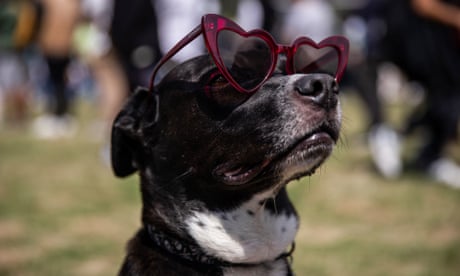
Not every scientist’s attention will be focused on the skies during Monday’s solar eclipse. Animal behaviorists at several zoos across its pathway will be watching creatures great and small for their reactions to the sudden, unexpected darkness.
The research is an extension of their observations from 2017’s most recent total eclipse in the US, when usually sedentary tortoises started rutting, frantic giraffes ran around aimlessly, and siamang gibbons embarked on an abrupt and tumultuous chorus of screams and barks.
“Most of the things that we saw then were related to what we call circadian responses, so sort of going into evening behavior, but we did see a lot of anxiety-related behavior as well,” said Adam Hartstone-Rose, professor of biological sciences at North Carolina State University, who will be leading a team of researchers and volunteer observers on Monday at Fort Worth zoo, Texas.
“Obviously the animals that are going to their bed area, they think that evening has fallen. But the anxiety one is a bit more mysterious, we don’t know the cause. It could be the animals are aware of some kind of disparity going on. If it all of a sudden seems dark, my dog, who is very food motivated, would worry we’d forgotten a meal for him, so that might be going through some of these animals’ heads.
“The most likely reason is the strangest animals of all we observed in 2017 were the people, doing crazy things, and I think that probably the animals might be having a reaction to the exuberance that the people display.
“The only way to know is to gather as much information as possible, keep trying to repeat it, hopefully find some species in quieter areas, potentially in the wild, and see what they do.”
Hartstone-Rose said much of the data will be collected by 30 or so high school volunteers who will travel to Texas from Vancouver, Canada.
“I’ve been training them for several months and they’re going to be the core of our animal observers,” he said.
The team will watch many of the species they did seven years ago when the eclipse passed over Riverbanks zoo in Columbia, South Carolina, the results of which were published in a 2020 paper co-authored by Hartstone-Rose for the National Library of Medicine.
As well as the amorous gopher tortoises, they recorded a male gorilla charging a glass enclosure, flamingos that clustered in an unusually tight bunch, and lorikeets that began chirping loudly and swooping en masse, which he said was a rare exhibition of synchronous behavior.
Also being watched on Monday, he said, were “some animals we think might do something interesting”, such as Fort Worth zoo’s bonobo apes.
“Along with chimpanzees, they’re our closest relatives, and are strange, fascinating and very cool apes. When bonobos have tension in the group, they also have sexual responses to that. They alleviate tension with all sorts of sexual behavior, including homosexual behavior,” Hartstone-Rose said.
Fort Worth is one of a number of zoos that will be hosting special eclipse events and encouraging the public to help with animal studies. They include Little Rock zoo, Arkansas; Toledo zoo and aquarium, Ohio; and Indianapolis zoo, Indiana.
The observations are more than just recreational, Hartstone-Rose said. “For one thing, it’s important for zoos to understand what kinds of activities, what kinds of events, cause anxiety to the animals, and we’re always trying to mitigate that,” he said.
“Pet owners are always concerned if their animals are going to be anxious, so understanding if this is truly something that eclipses cause in animals is valuable.
“But the main reason it’s important is because this is a fundamental curiosity that humans have. Everybody who owns a dog has wondered at least on a weekly basis what that animal is thinking, and cats are even more mysterious, so it’s something interesting to contemplate, especially in an event like an eclipse, which is a powerful and surprisingly emotional experience.
“For this one moment, on this one particular day, everybody is going to have this shared experience. There’s something beautiful about that, and sharing it with our animal brethren just adds to it.”